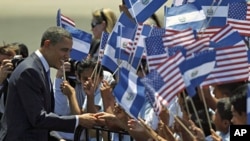During his five day trip to Brazil, Chile and El Salvador, President Barack Obama spoke in soaring tones about the progress of democracy and economic and social advancement in Latin America. Mr. Obama now faces the task of following through with commitments he made.
Though distracted from the very beginning of his trip in Brazil, through its conclusion in El Salvador, by events in Libya and the Middle East, White House aides say President Obama accomplished the main goals of his Latin America journey.
In major speeches in Rio de Janeiro and Santiago, he underscored what he sees as the importance of the Americas to the United States, and noted the progress countries have made in solidifying democracy, economic growth, and fighting poverty.
The president announced new business and clean energy partnerships, dialogues and other cooperation and set new goals to increase student exchanges.
In his speech in Chile, directed to the people of Latin America, he recalled the Alliance for Progress initiated by President John F. Kennedy 50 years ago.
"The realities of our time, and the new capabilities and confidence of Latin America, demand something different. President Kennedy's challenge endures; to build a hemisphere where all people can hope for a sustainable, suitable standard of living, and all can live out their lives in dignity and in freedom," he said. "But half a century later, we must give meaning to this work in our own way, in a new way."
In what the White House calls partnerships for progress, President Obama outlined goals of increasing U.S. trade and investment with Latin America. He reiterated his intention to resolve outstanding issues and move trade agreements with Colombia and Panama to approval by the U.S. Congress.
Partnerships for Progress also includes cooperative efforts to confront insecurity and violent crime, cooperation on clean energy technologies, and enhancement of defense cooperation. Mr. Obama also reaffirmed U.S. support for regional efforts to fight crime and drug gangs in the region.
White House officials say the primary objective of the president's Latin America trip, underscoring the importance of the Americas to him personally and to the United States, was accomplished.
But while officials say the president is committed to following through with the commitments, the proof will be in the doing, something Mr. Obama referred to in his keynote speech delivered in Santiago.
"Now, I know I am not the first president from the United States to pledge a new spirit of partnership with our Latin American neighbors. Words are easy, and I know that there have been times where perhaps the United States took this region for granted," he said.
Coming weeks and months will determine whether Mr. Obama can make progress on two important issues, one being the resolution of outstanding issues preventing free-trade agreements with Panama and Colombia from being presented to the U.S. Congress for approval.
Calling the work of following up on a presidential trip is a "constant grind," National Security Council Senior Director for Western Hemisphere Affairs Dan Restrepo underscored the administration's determination to finalize the trade pacts.
"On the case of the Colombian and Panama free-trade agreements, we have been working with and continue to work with the Colombians and the Panamanians to resolve outstanding issues with the hope of being able to move forward as successfully as soon as possible," Restrepo said.
President Obama has a more difficult road regarding his commitment, stated in his speech in Chile and remarks in el Salvador, to achieve reform of the U.S. immigration system, something that politics in Washington has prevented.
In El Salvador, the president referred to the difficulty of achieving bipartisan immigration reform legislation in the face of opposition by Republicans on Capitol Hill.
"My hope is that they [Republicans] begin to recognize over the next year that we cannot solve this problem without taking a broad, comprehensive approach," he said.
In his visits to Brazil, Chile and El Salvador, President Obama also delivered a clear message about his view of the importance of human rights and basic freedoms across Latin America.
In Santiago, he called for a recommitment of principles in the Inter-American Democratic Charter, approved on September 11, 2001 by the Organization of American States.
In a connection to events in North Africa and the Middle East, Mr. Obama said the accomplishments of the people Chile can serve as an example to people elsewhere in the world "reaching for their freedoms."






